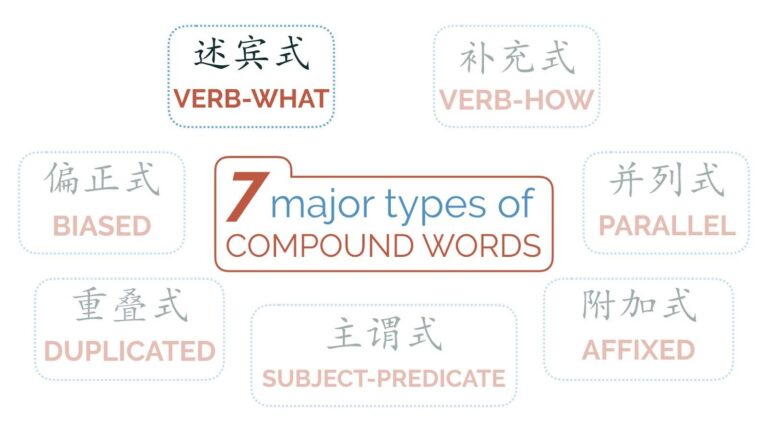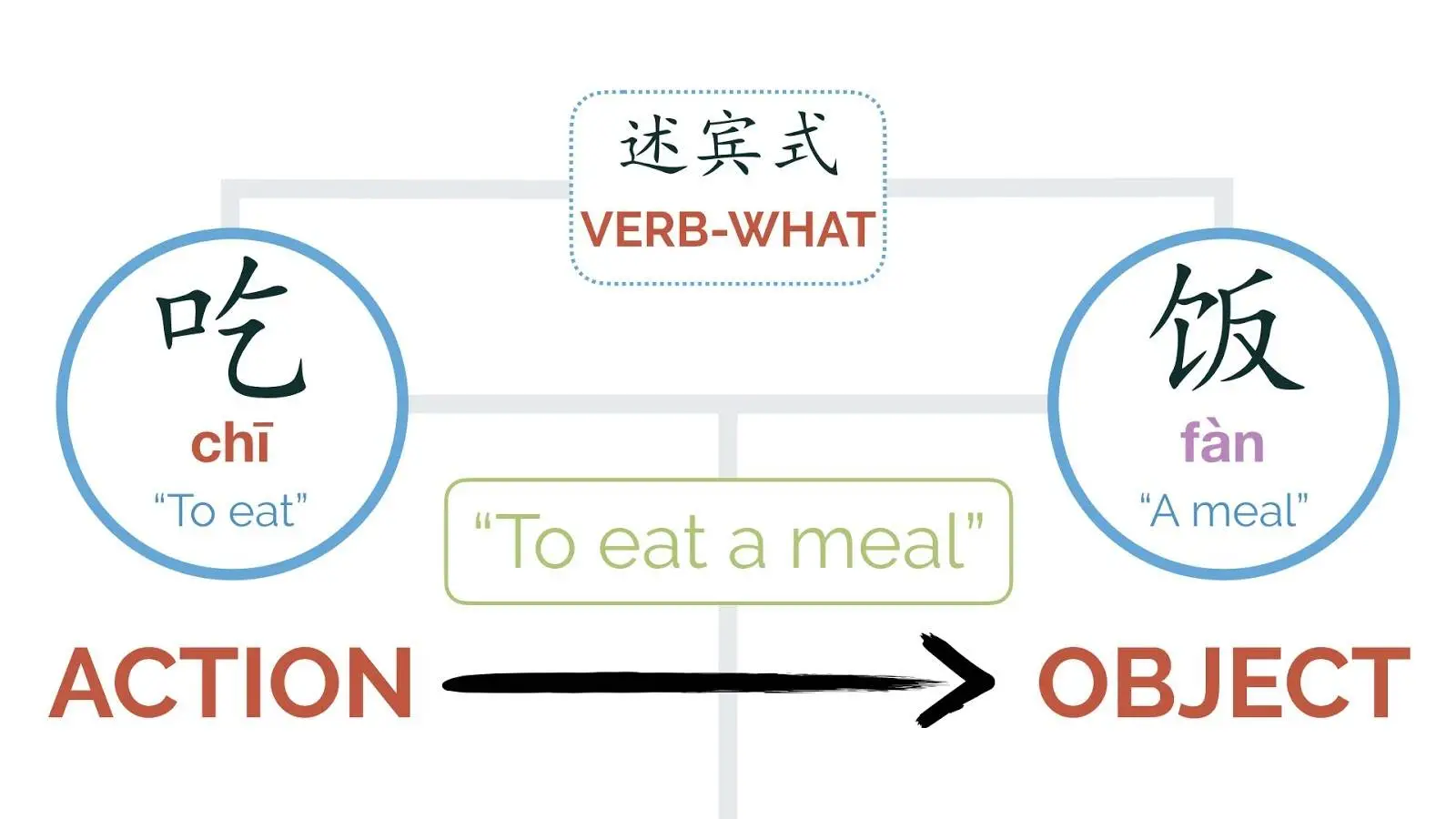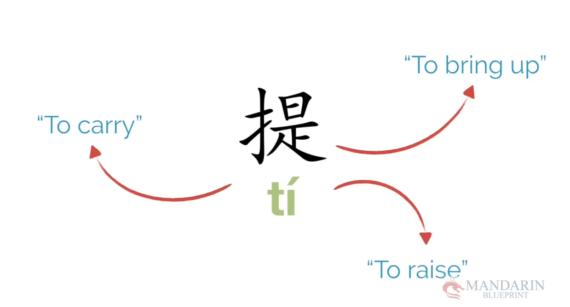What? Chinese Words are Easy?

Word Structure: Verb-What 述宾式
This is part 2 of an 8-part series exploring all 7 types of Chinese compound words. Click below for the other parts:
Part 1 – Part 2 – Part 3 – Part 4 – Part 5 – Part 6 – Part 7 – Part 8
Verb-What 述宾式

We call this type of Chinese word the Verb-What category because the first morpheme is always a verb, and the second morpheme indicates what is receiving the action of the verb. They can be verbs, nouns, or adjectives.
Verbs
吃饭 chīfàn- to eat
Verb: to eat 吃. To eat what? A meal 饭.
抽烟 chōuyān- to smoke cigarettes
Verb: to smoke 抽. To smoke what? Cigarettes 烟.
说话 shuōhuà- to speak (words)
Verb: to speak 说. To speak what? Words 话.
担心 dānxīn- to worry
Verb: to carry or to shoulder 担. To carry or should what? One’s heart 心.
骂人 màrén- to scold
Verb: to scold 骂. To scold what? People 人.
伤心- shāngxīn- to break one’s heart
The first morpheme 伤 means to harm or to hurt. What is being hurt? A heart 心. Thus the meaning of “to break one’s heart” makes perfect sense.
上万 shàngwàn,上山 shàngshān
When used as a verb, 上 means “to go on, to go on top.” The first word here is abstract, but a direct translation would be “to go above 10,000 (万)”. The second is less abstract; it means to go on a mountain 山. The mountain is the morpheme receiving the action.
出名 chūmíng,出国 chūguó,出门 chūmén,出口 chūkǒu,出厂 chūchǎng,出奇 chūqí,出水 chūshuǐ,出土 chūtǔ
All of these examples will illustrate the idea of first explaining that something is “coming out or exiting” (出), and then what is receiving this verb. 出国 means “to leave the country.” 出水 means “to come out of the water,” 出土 means to excavate, or “come out of the soil.” First the verb, then what is receiving the verb.
下水 xiàshuǐ
Verb: Go Under 下. Go under what? The water 水。
有时 yǒushí,过时 guòshí
Verb: To have 有, to go over 过. Have/go over what? Time 时.
灭火- mièhuǒ
Verb: To extinguish 灭. To extinguish what? Fire 火.
消炎- xiāoyán
Verb: To eliminate or dispel 消. To dispel what? Inflammation or infection 炎
点名- diǎnmíng
Verb: To call out 点. To call out what? Names 名. (Roll Call)
过量- guòliàng
Verb: to overdue 过. To overdue what? The amount 量.
消灾- xiāozāi
Verb: To eliminate or dispel 消. To dispel what? The disaster 灾.
作文- zuòwén
Verb: to do 作. To do what? Your school assignment 文.

Nouns
知己- zhījǐ
Verb: to know 知. To know what? Oneself 几. As a Noun: An intimate friend
司机- sījī
Verb: to operate 司. Operate what? A machine 机. As a noun: Driver.
管家- guǎnjiā
Verb: to manage 管. To manage what? A house 家. As a noun: Housekeeper
立夏- lìxià
Verb: to establish 立. To establish what? The summer 夏. As a noun: The Start of Summer
护膝- hùxī
Verb: to protect 护. To protect what? Your knee 膝. As a noun: Kneepad
Adjectives
有钱 yǒuqián- rich
Verb: to have 有. To have what? Money 钱.
有用 yǒuyòng- useful
Verb: to have 有. To have what? Usefulness 用.
丢人 diūrén- embarrassing, be disgraced
Verb: to lose 丢. To lose what? Yourself (person) 人.
动人- dòngrén
Verb: to move (emotionally) 动. Move what? People 人.
有名- yǒumíng
Verb: to have 有. To have what? Fame (or a name) 名.
好奇- hàoqí
Verb: to be fond of 好. To be fond of what? The strange of interesting 奇. (Curious)
烦人- fánrén
Verb: to annoy 烦. To annoy what? People 人.
在内- zàinèi
Verb: to be located 在. To be located where? Inside 内.
有力- yǒulì
Verb: to have 有. To have what? Power 力.
So there you have it, Chinese words are easy after all!








